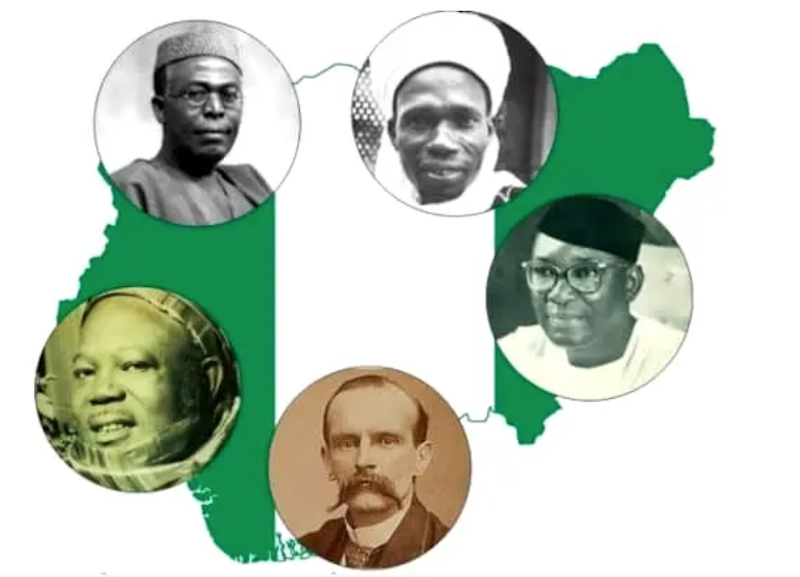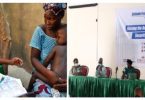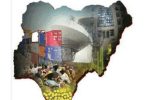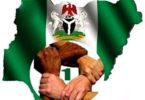They were learned people. They struggled anf faltered along the way. Nevertheless, they harnessed all their resources to work towards the establishment of an independent Nigeria. Some of them even paid the supreme sacrifice of facing persecutions and in some extreme cases, political martyrdom. These Nigerian heroes of democracy deserve honorable mention for their contribution to the Nigerian project. If not for anything else, but to immortalize and celebrate them and their vision for a strong, greater Nigeria of the future.
We proudly make mention of the following great men and women. They are the Nigerian heroes who fervently.worked to lay the foundation of future governance and democracy in Nigeria. The labours and sacrifices will never be forgotten.
Herbert Macaulay
Herbert Macaulay was one of the foremost Nigerian nationalists who paved the way for the future Nigeria. He was one of the Nigerian heroes who strove for the nation’s independence while still under British colonial rule. He is popularly tagged the father of modern Nigerian nationalism.
Right from the 1920s, Macaulay teamed up with fellows to protest against unfavorable policies of the British government. Such policies cut across land issues, management of railway finances, and water (and other utility) rates. He set up the first political party in Nigeria namely the Nigerian National Democratic Party (NNDP) in 1923. The NNDP remained in operation up until the late 1930s, when it merged with the Nigerian Youth Movement. Thus they formed the National Council of Nigeria and the Cameroons (NCNC), a formidable group that strongly advocated for Nigeria’s independence.
Anthony Enahoro
Anthony Enahoro was a mere fledgling, a 21-year old man when he became the editor of the Southern Nigerian Defender newspaper in 1944. The newspaper entity belonged to prominent politician and nationalist, Nnamdi Azikiwe. He went ahead to serve as editor for other newspaper outlets such as Zik’s Comet, West African Pilot, and Morning Star between 1945 and 1953.
Vocal and determined, Anthony Enahoro was a member of the Nigerian parliament in 1953 when he moved the motion for Nigeria’s independence. This was the first-ever attempt by any statesman or politician to demand for the nation’s self-rule. The northern members of the parliament reportedly staged a walkout following this demand. The move was not supported at the onset; and it suffered several rejections on being presented again and again. But Enahoro succeeded in starting a movement towards the decolonization of Nigeria with his motion. In the years that followed, the motion gathered more forces within and outside the government circles until it became a reality.
Michael Imoudu
Michael Imoudu was a foremost and active Labour Union leader in Nigeria. He headed several trade unions in Nigeria between 1947 and 1958, and mobilized support for the improved welfare of workers. Imoudu eventually succeeded in bringing several Nigerian labour unions together as the president of the All Nigeria Trade Union Federation. He was able to incorporate 45 out of the 57 registered labour unions under the umbrella of the Federation during his tenure.
Funmilayo Ransome-Kuti
The wife of an Egba reverend (and pioneer leader of the National Union of Teachers), Funmilayo Ransome-Kuti was an activist and revolutionist. She mobilized Egba women to resist the British colonial rule; thus she was tagged ‘the Lion of Lisabi’. She was quite vocal in speaking against undesirable colonial policies. That included the exclusion of women from communal decision-making, and harsh tax policies.
Funmilayo Ransome-Kuti organized a women’s conference in Abeokuta in 1953 to discuss the welfare of women. The event led to the establishment of a foremost women’s rights group namely the Federation of Nigerian Women’s Societies (FNWS).
Funmilayo Ransome-Kuti was the mother of three prominent individuals, who were also political activists. They are renowned doctors, Olikoye and Beko Ransome -Kuti; and the legendary Afrobeat musician, Fela Anikulapo-Kuti.
Margaret Ekpo
While Funmilayo Ransome-Kuti anchored the women’s movement towards decolonization in southwest Nigeria, Margaret Ekpo was her fellow co-activist in the southeast. Margaret Ekpo fought through pre-colonial Nigeria in the southeast, mobilizing women at the grassroots to fight for their rights. She attended political and activists’ meetings in the 1940s, where unfavourable policies of the British colonial government were discussed. Her husband, John Ekpo, was a medical doctor and civil servant who was a victim of the same bad policies.
Subsequently, Margaret Ekpo became a member of the National Council of Nigeria and the Cameroons (NCNC) and worked side-by-side with Funmilayo Ransome-Kuti. She rose to become a key woman politician, all the while encouraging women to participate more in politics. She was eventually nominated by the NCNC in 1953 to jojn the regional House of Chiefs. A year later, Margaret Ekpo was able to set up the Aba Township Women’s Association, a women pressure group.
Nnamdi Azikiwe
One of the most popular Nigerian heroes and nationalists was the great ‘Zik of Africa’, Nnamdi Azikiwe. Azikiwe was a renowned journalist, newspaper publisher, political leader and pan-Africanist.
Azikiwe was well-educated, as he attended four promient schools in the USA. Namely Storer College, Columbia University, University of Pennsylvania, and Howard University. Then in 1934, he returned to British West Africa to start a journalist career in the Gold Coast. He founded a number of newspaper outfits, including Zik’s Comet and West African Pilot.
Azikiwe was actively involved in the movement to liberate Nigeria from colonial rule. He eventually became the first president of independent Nigeria from 1963 to 1966.
Ahmadu Bello
Sir Ahmadu Bello, the erstwhile Sardauna of Sokoto, was the premier of northern Nigeria from 1954 to 1966. He was a powerful and highly influential politician amongst the northern elite, and he unified northern Nigeria during his tenure. Ahmadu Bello was also the head of Nigeria’s ruling party, the Northern Peoples Congress (NPC) at that time. Unfortunately, he was assassinated in 1966 during the first military coup in Nigeria – one of the events which led to the Nigerian Civil War.
Ahmadu Bello pushed for the modernization and education of people of northern Nigeria, including the modernization of Koranic education. He was also the brain behind the establishment of Northern Nigeria Development Corporation (NNDC), Bank of the North, and Northern Nigeria Investments Ltd (NNIL). His portrait is boldly displayed on Nigeria’s 200 Naira banknote.
Tafawa Balewa
Tafawa Balewa was the deputy of Sir Ahmadu Bello, while the latter was the premier of northern Nigeria. Balewa worked towards unifying the entire nation, as part of the plan to decolonize Nigeria ahead of independence. Thus, he joined forces with Nnamdi Azikiwe to form a coalition government between the Northern People’s Congress and the National Council of Nigeria and the Cameroons.
Balewa further moved another motion for Nigeria’s independence to the parliament in 1959 (following Anthony Enahoro’s original motion). And this time, the motion received meaningful attention. It helped to sustain the pressure to liberate Nigeria from the British colonial government until it was granted on 1st of October, 1960.
Balewa was a key member of the Northern Peoples Congress (NPC), which succeeded in winning most of the seats in the Federal House of Representatives. He eventually became the first Prime Minister of Nigeria in 1960. However, Balewa was one of the victims of the assassionation plot during the first military coup of 1966.
Chief Obafemi Awolowo
A prominent journalist, lawyer and politician, Chief Obafemi Awolowo was one of the nationalists who strove for Nigeria’s independence. He was also the premier of the Western region.
He was a well-educated fellow – an alumni of the University of London (Bachelor of Commerce); and was called to the Bar by the Honourable Society of the Inner Temple in 1946. He continued to function throughout the First and Second Republics, and the Nigerian Civil War. He was the convener of the Action Group (AG); and via the group he demanded for a federal constitution for pre-colonial Nigeria. The demand was granted in the 1954 Lyttleton Constitution.
Awolowo founded the Nigerian Tribune newspaper in 1949. He was able to use the newspaper to mobilize Nigerians towards the nationalist movement.
Hajia Gambo Sawaba
The unforgettable Gambo Sawaba was a foremost women’s rights activist, politician and philanthropist in northern Nigeria. She endured many obstacles and persecution from the male-dominated northern elite, but refused to give up. Sawaba was further mentored by Yoruba women’s activist, Funmilayo Ransome-Kuti, whom she met years later in Abeokuta.
Gambo Sawaba rose to become a prominent politician in the course of her dogged fight to uphold women’s rights in northern Nigeria. She fervently campaigned for Western education in northern Nigeria, especially for women. She also campaigned against under-aged marriages, and forced labour. Gambo Sawaba was eventually elected the Vice-Chairman of the Great Nigeria People’s Party. She was also chosen as leader of the national women’s wing in the Northern Element Progressive Union (NEPU).
Sawaba courageously spoke in defence of women’s rights in a world controlled by strict Islamic laws and traditions that restricted women to the background. She eventually won the admiration and support of the British colonial government, and the ruling Hausa elite.
Joseph Tarka
Joseph Sarwuan Tarka was a well-known Benue politician and nationalist. He was a nominated member of the Nigerian Constitutional Conference of 1957. Equally, he was elected the representative of the Middle Belt zone to the Henry Willinks Commission of 1958. In that same 1958, he was appointed a shadow Minister of Commerce. Yet again, Tarka served first as Minister of Transport, and then as Minister of Communication in General Yakubu Gowon‘s government (in the 1960s).
Tarka was a foremost advocate of state creation, which he recognized would give more economic and political powers to minority groups in the country.
Remi Fani-Kayode
As a member of the House of Representatives in Lagos, Remi Fani-Kayode was one of the nationalists that moved a motion seeking for Nigeria’s Independence. That was in the year 1958. He further proposed that the 2nd of April, 1960 be chosen as the date for Nigeria’s Independence.
Chief Remi Fani-Kayode later became the deputy premier of Nigeria”s Western region in 1963. Between the late 1940s and 1995, Chief Remi Fani-Kayode actively functioned as a prominent Nigerian lawyer, nationalist, and politician.








